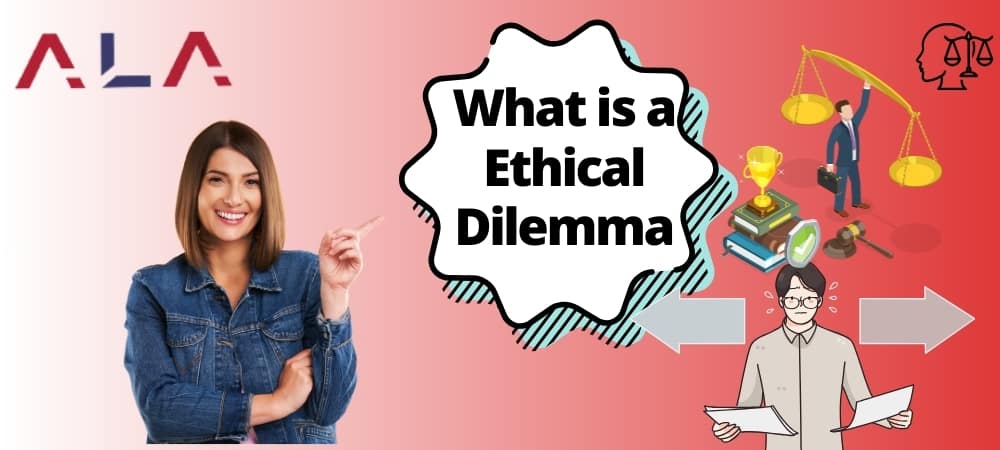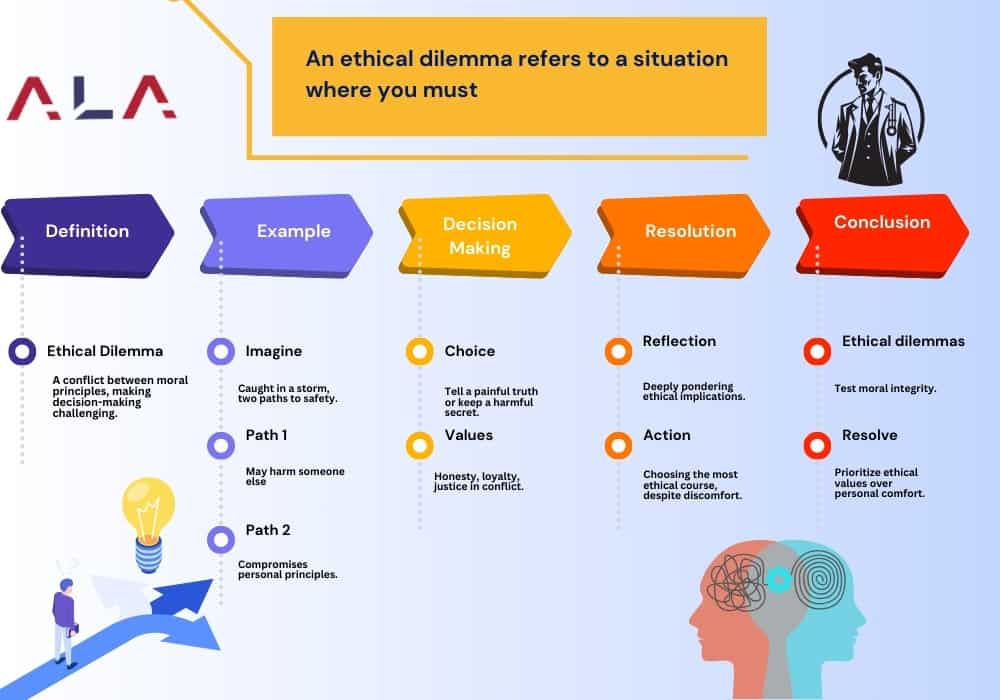


An ethical dilemma, consequently, is a complex situation that often involves an apparent mental conflict between moral imperatives; obeying one would inevitably lead to transgressing another.
It's like being stuck between a rock and a hard place, but in terms of your conscience. Imagine you find a wallet full of cash with no identification.
The ethical dilemma is the internal battle you face: do you keep the money, finding no harm in benefiting from an anonymous loss, or do you turn it in, hoping it finds its way back to its owner, despite no guarantee of this happening?
It's these kinds of scenarios that challenge our values, forcing us to ponder what is truly right or wrong.
An ethical dilemma occurs when a person faces a situation requiring a choice between two equally important values or principles.
It's like being at a crossroads, where every direction seems right but choosing one means you have to compromise or sacrifice the other.
These dilemmas often arise in situations where there's a conflict between moral duties, such as the need to tell the truth versus the need to protect someone's feelings.
What makes these dilemmas particularly challenging is that there's no clear-cut answer or solution that fully satisfies all ethical requirements, leaving the individual to weigh the consequences of each option carefully.
Ethical dilemmas permeate various sectors, challenging professionals to make tough decisions.
In business, dilemmas often revolve around profit versus social responsibility. Nursing dilemmas include patient autonomy versus care standards. Social work faces confidentiality against the need to intervene for safety.
Current ethical dilemmas reflect today's global crises and technological quandaries. Childcare dilemmas involve balancing children's rights with parental wishes.
Lastly, ethical dilemmas in sport tackle fairness, doping, and inclusivity. Each area demands a delicate balance between competing values, requiring thoughtful reflection and often, difficult choices.
Business ethical dilemmas often place professionals at a crossroads where they must choose between making a profit and maintaining moral integrity.
These situations can range from deciding whether to overlook minor safety concerns for a product launch to balancing shareholder interests with those of the community or environment.
The crux of such dilemmas lies in the conflict between doing what is beneficial for the business in the short term and what is right in the broader, ethical sense.
Navigating these dilemmas requires a deep understanding of one's values, the courage to make tough decisions, and a commitment to ethical principles, even when they come at a cost.
Nursing ethical dilemmas often place healthcare professionals in tough spots where they must balance care standards with personal and patient values.
One common scenario involves respecting a patient's refusal of treatment due to personal or religious beliefs, even when such decisions might lead to adverse health outcomes.
Nurses navigate these waters with empathy and professionalism, advocating for patient autonomy while ensuring all possible outcomes are clearly communicated.
The heart of such dilemmas lies in the clash between the duty to heal and the respect for individual choice, requiring nurses to make decisions that honor both ethical principles and patient rights.
Social work ethical dilemmas often arise when practitioners are caught between conflicting responsibilities or when they must choose between equally undesirable outcomes.
These dilemmas can involve situations where a social worker must decide between protecting a client's confidentiality and the need to disclose information for the client's or others' safety.
For example, if a social worker learns that a client poses a risk to themselves or others, they must navigate the delicate balance between respecting the client's privacy and taking necessary steps to prevent harm.
Such dilemmas require careful consideration, ethical reasoning, and often, consultation with colleagues or supervisors to find the most ethically sound solution.
Current ethical dilemmas are deeply intertwined with rapid technological advancements and societal shifts. Issues like privacy concerns in the age of digital surveillance, ethical considerations around artificial intelligence and its impact on employment, and the moral implications of genetic editing are at the forefront.
Climate change and environmental sustainability also pose significant ethical questions, challenging us to balance economic growth with the health of our planet.
Additionally, global health crises, such as pandemics, raise dilemmas about vaccine distribution, public health measures versus individual freedoms, and the ethics of healthcare resource allocation.
These dilemmas reflect the complex interplay between technology, personal rights, and collective well-being in our modern world.
Navigating the complex world of childcare often presents ethical dilemmas that challenge even the most experienced professionals. One common quandary involves balancing the need to respect a child's autonomy with the responsibility to ensure their safety and well-being.
For instance, when a child discloses confidential information that could indicate harm or neglect, caregivers must decide whether to breach confidentiality to protect the child.
These decisions are never taken lightly, as they weigh heavily on the principles of trust and protection. Ethical dilemmas in childcare require a delicate balance of empathy, moral judgment, and a deep understanding of the developmental needs and rights of children.
Ethical dilemmas in sports are complex issues that challenge the integrity of athletes, coaches, and organizations.
These dilemmas can range from performance-enhancing drug use, where athletes face the tough choice between fair play and the pressure to win, to issues of gender equality and inclusion, such as the debate over transgender athletes' participation in sports.
There's also the ethical consideration of athlete welfare versus commercial interests, highlighting the conflict between prioritizing athletes' health and the push for profit and success.
Navigating these dilemmas requires a delicate balance of moral judgment, respect for the spirit of competition, and a commitment to fairness and respect for all participants.
Ethical dilemmas in real life often place individuals at a crossroads, requiring them to make tough decisions between two morally conflicting options.
For instance, imagine a doctor who must choose between saving the life of one critically ill patient with a rare blood type using the only unit of matching blood available, or saving several patients needing less of it for routine surgeries.
Another example is a business owner facing the choice of laying off a portion of their workforce to keep the company afloat during tough economic times or keeping all employees but risking the business's closure.
These scenarios exemplify the complex nature of ethical dilemmas, where choices are not easily categorized as right or wrong, but rather demand a deep consideration of values, consequences, and moral principles.

An ethical dilemma refers to a situation where you must choose between two conflicting moral principles, thereby making it challenging to determine what is right.Imagine being caught in a storm, with two paths to safety:
one path could potentially harm someone else, while the other might compromise your own principles. It's like choosing between telling a painful truth or keeping a harmful secret.
These dilemmas force us to weigh our values, such as honesty, loyalty, and justice, against each other. Ultimately, navigating an ethical dilemma involves deeply reflecting on what we believe is the most ethical course of action, even when neither choice feels entirely right.
An ethical dilemma occurs when a person is faced with a situation that challenges them to choose between two morally right or conflicting principles, where adhering to one would result in transgressing the other.
This typically happens in scenarios where there's no clear right or wrong answer, forcing the individual to weigh the consequences of their decisions on both themselves and others.
Ethical dilemmas often arise in professional settings, personal relationships, and within societal norms, pushing individuals to deeply reflect on their values, responsibilities, and the broader impact of their actions on the community and their own conscience.
Ethical and moral dilemmas in healthcare are complex challenges that professionals face daily, balancing the needs and rights of patients against broader societal and medical standards.
These dilemmas often involve making tough decisions about patient care, such as end-of-life issues, confidentiality, and the allocation of limited medical resources.
Healthcare workers must navigate these situations with compassion and wisdom, often relying on ethical guidelines and personal integrity to make decisions that can have profound impacts on patients' lives.
The heart of these dilemmas lies in the question of what is the right thing to do, a question that sometimes has no clear or easy answers.
Ethical dilemmas in healthcare often involve situations where professionals face tough decisions, balancing patient care with legal and moral considerations.
For example, a doctor might struggle with whether to respect a patient's refusal of treatment due to religious beliefs, even if the treatment could save their life.
Another common dilemma is deciding how to allocate limited resources, like organ transplants, which forces healthcare providers to choose which patients receive life-saving treatments.
Additionally, maintaining patient confidentiality while recognizing situations that might require disclosing information for the greater good, such as in cases of public health risks, presents another ethical challenge.
These dilemmas require careful consideration of ethical principles, patient rights, and societal needs.
Ethical dilemmas in social work are complex situations where professionals face conflicting responsibilities and values, often involving the well-being of their clients.
These dilemmas can arise from various scenarios, such as deciding between respecting a client's confidentiality and the need to disclose information for the client's safety or others.
Social workers must navigate these challenges with sensitivity and professionalism, balancing their duty to help with legal and ethical guidelines.
The core of these dilemmas often involves making tough choices that can have significant impacts on people's lives, requiring a deep understanding of ethical principles and a commitment to the best outcomes for all involved.
In social work, ethical dilemmas often arise when practitioners are faced with two conflicting duties or principles.
One common example is the conflict between respecting client confidentiality and the need to disclose information to prevent harm.
For instance, if a social worker learns that a client is in a situation that could potentially harm themselves or others, the social worker must decide whether to break confidentiality to intervene for safety's sake.
Another example involves allocating limited resources; a social worker might struggle to decide which of several clients in need should receive scarce support or services, knowing that not all can be helped equally.
These scenarios require careful consideration and ethical decision-making to navigate the complexities of social work practice.
Sample ethical dilemmas often involve situations where choices must be made between two morally correct options that are in conflict, or deciding the lesser of two evils.
For instance, imagine a doctor who has two patients in critical need of organ transplants, but only one organ is available.
How does the doctor choose who receives the transplant?
Another example could be a journalist who uncovers a story that could bring about positive change but might harm innocent people in the process.
These dilemmas force individuals to weigh the consequences of their decisions, often without a clear or easy answer, highlighting the complexity of ethical decision-making in real-life scenarios.
Concluding thoughts on ethical dilemmas highlight the intricate balance between moral principles and practical decision-making in real-world scenarios.
These dilemmas often present challenging choices that require deep reflection and critical analysis, underscoring the importance of ethical reasoning in both personal and professional realms.
For students grappling with these complex issues, especially in the context of legal studies, seeking law assignment help in Australia can provide invaluable guidance.
Such support not only aids in navigating the complexities of ethical dilemmas but also enhances understanding of legal principles, ultimately contributing to more informed and conscientious decision-making.